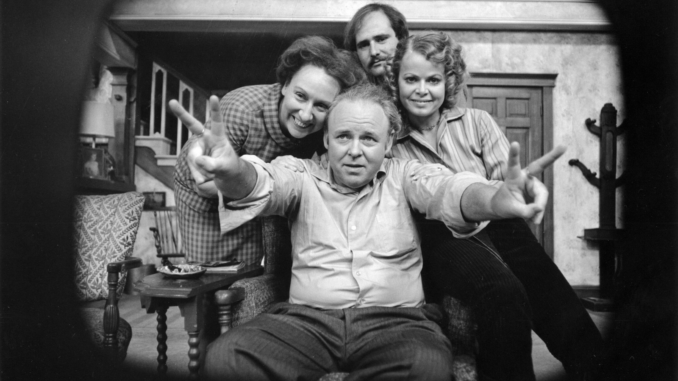
Introduction: In the early 1970s, American television was dominated by light-hearted sitcoms, offering nothing more than slapstick humor and innocent, simplistic plots. That is, until All in the Family arrived on CBS in January 1971, disrupting the status quo and bringing a raw, unfiltered look at family dynamics, societal issues, and the complexities of human relationships. Created by Norman Lear, the show broke boundaries in ways no one could have predicted, addressing controversial topics like racism, sexism, and bigotry with unparalleled honesty and humor. It was unapologetically bold, and this is exactly why it has remained beloved by fans, cherished as one of the greatest television shows of all time.
The Historical Context: Why All in the Family Was So Revolutionary: At the time of its debut, America was going through significant cultural and political upheaval. The Civil Rights Movement was in full swing, women were demanding equality, and the youth were challenging traditional norms. The nation was divided, and yet television had remained mostly politically neutral, preferring feel-good family sitcoms that avoided tough conversations. Enter All in the Family, a show that refused to shy away from the complexities of American life.
The protagonist, Archie Bunker (played by Carroll O’Connor), was a working-class man who embodied the outdated, prejudiced viewpoints of many older Americans. His character reflected the biases of the time, but rather than portray him as a mere villain, the show allowed audiences to see the nuances of his personality. The show challenged viewers to confront uncomfortable truths about race, class, and gender while still managing to inject humor into serious conversations. This combination of candidness and comedy was a game-changer.
A Family Like No Other: The Bunker Family At its core, All in the Family was about a family struggling to get along in a rapidly changing world. The Bunkers were an ordinary, imperfect family who fought, laughed, and cried just like every real family. But what made the Bunkers so special was how they represented different perspectives that existed within the same household.
- Archie Bunker, played by the iconic Carroll O’Connor, was the embodiment of the “working-class” American man, often clashing with his progressive son-in-law, Mike Stivic (Rob Reiner). Archie was a man full of contradictions: hard-headed and stubborn, but also full of love for his family. His bigoted views were often met with the modern sensibilities of his son-in-law Mike, who was constantly challenging Archie’s outdated opinions.
- Edith Bunker (Jean Stapleton), Archie’s wife, was the heart and soul of the show. Although she was often the target of Archie’s ridicule and underappreciated by those around her, Edith represented kindness, empathy, and unconditional love. She was the stabilizing force of the family, often defusing tension with her gentle nature.
- Gloria Bunker Stivic (Sally Struthers), the Bunkers’ daughter, was caught in the middle between her father’s antiquated views and her husband’s liberal ideals. Gloria’s character became a symbol of the evolving woman in society—independent, opinionated, yet also deeply devoted to her family.
- Mike Stivic (Rob Reiner), known affectionately as “Meathead,” was the counterpoint to Archie’s gruffness, a progressive and idealistic young man who saw the world in a way Archie simply could not. Their back-and-forth banter became one of the show’s most beloved dynamics, showcasing the clash between generations and ideologies.
Together, these characters created a dynamic that both entertained and provoked thought, as viewers were forced to examine their own beliefs and biases through the lens of family life.
Emotional Depth and Unforgettable Moments: While the show is often remembered for its humor, it’s the emotional moments that have left a lasting impact on audiences. All in the Family wasn’t afraid to delve into the real struggles that families face, from dealing with loss to addressing the emotional toll of racism and poverty. The show’s emotional depth is what truly set it apart from other sitcoms of the time.
One of the most memorable episodes is “Edith’s 50th Birthday,” in which Edith is nearly assaulted, and the family rallies around her. It’s an episode that highlights the vulnerability of women and shows the strength of the family bond in difficult times. Similarly, the episode “The Draft Dodger,” where Mike’s old friend reveals that he avoided the Vietnam War draft, explores themes of patriotism, personal values, and societal expectations.
The Show’s Legacy: Why All in the Family Endures: More than fifty years after its premiere, All in the Family remains a cultural touchstone for how TV can address complex societal issues with humor, honesty, and authenticity. Its success can be attributed not just to the witty writing and memorable characters, but to the way it broke taboos and created a dialogue about the most challenging issues of the day. For many, the show is a nostalgic reminder of a time when television was daring, pushing boundaries in ways that were both humorous and thought-provoking.
In today’s fractured, politically charged climate, All in the Family remains an important reminder that we need to be able to laugh at ourselves, while also being willing to confront uncomfortable truths. Its timeless themes of family, love, and acceptance are just as relevant today as they were when the show first aired.
